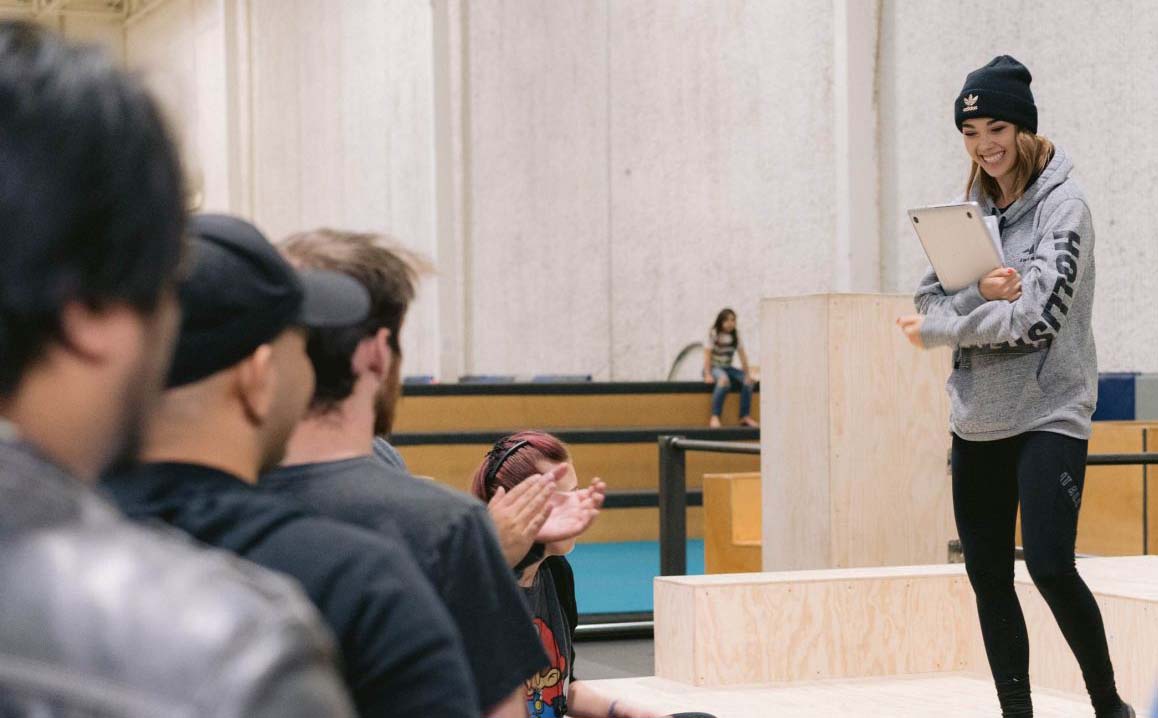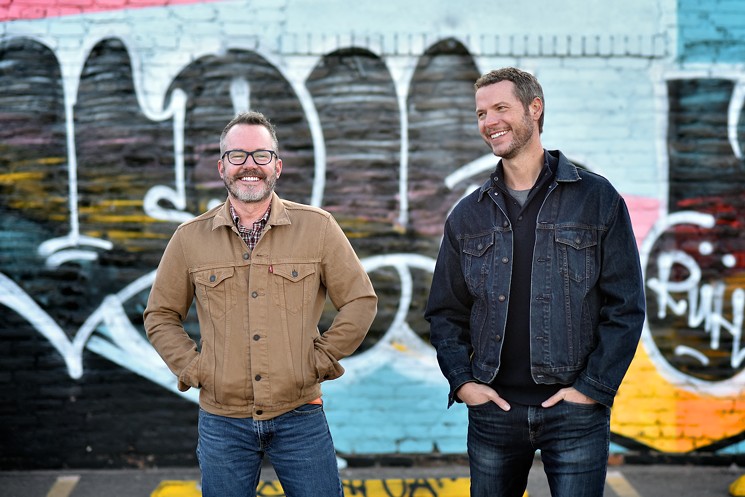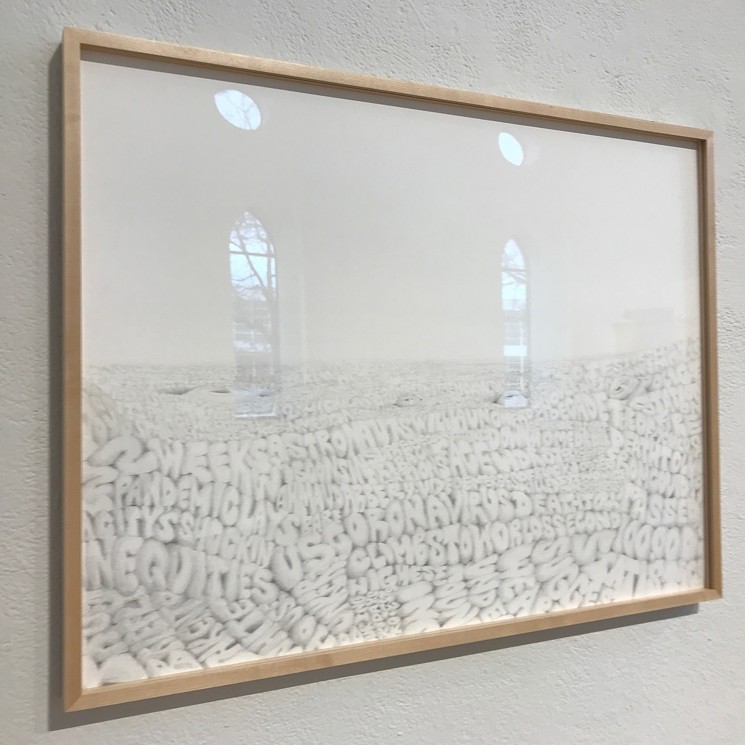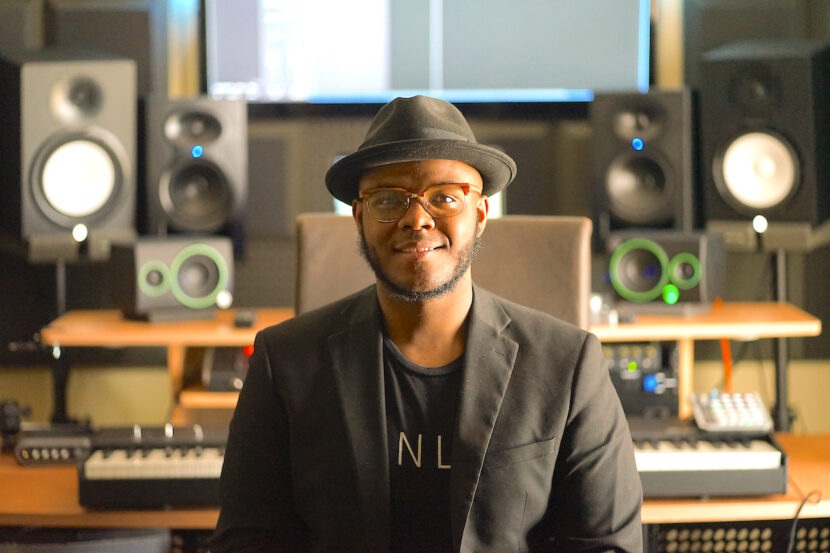FROM THE CAM NEWSROOM
Discover Programs In:
-

Storm Gloor and Students Join Amplify Music Conference to Support and Grow the Music Community
Apr 20, 2021 byStorm Gloor, CAM Music & Entertainment Industry Studies faculty, City Councilman, and creative community activist, is co-leading the Amplify Music 2021 Conference. The free conference brings together diverse music leaders and creators online to learn and share from local community response, emergent solutions, and heroic efforts to support local artists, venues, creative communities, and support networks in the surge/challenges of the COVID-19.Full story -

Meet Maddy Santamaria '21, Director, Editor, & Motion Graphics DesignerOpens in a new window
Apr 20, 2021"Whether it’s compartmentalizing a monstrous project into bite-size pieces that you take one at a time, or even taking a leap of faith and jumping off into the deep end. Always push yourself to do something out of your comfort zone, because that is when you truly start to see your potential."Opens in a new window Full story -

"Musicians Tip Jar" Podcast Digs Into the Music BusinessOpens in a new window
Apr 8, 2021(Westword)––CU Denver Singer/Songwriter faculty, Chris Webb, has launched a podcast offering advice to musicians on how to hone their trade—like the ins and outs of live-streaming, selling merch and being a songwriter for hire.Opens in a new window Full story -

Vote for Finn O'Sullivan in the John Lennon Songwriting Contest
Apr 5, 2021 byAre you listening to Finn O’Sullivan? She's making major waves in the singer/songwriter scene with her witty lyrics and perfectly-crafted songs––in fact, she's won the grand prize in the folk category of the The John Lennon Songwriting Contest for the title song of her first LP, "When the Power Comes Back On." Now she is she's competing head to head for the Lennon Award, which is determined by voting.Full story -

Grace DeVine Shoots for the Moon on Her New Single, "Maniac"Opens in a new window
Mar 29, 2021DeVine, a student at University of Colorado Denver, writes songs grounded by strong, reliable pop-ballad beats and suffused with celestial electronic ornaments.Opens in a new window Full story -
Cool Schools: Cleo Parker Robinson Dance teaches STEM career options to students
Mar 27, 20213D Animation student Pauline Nunez shares how her experience interning with the tech team at the Cleo Robinson School of Dance has influenced her as student, innovator, and creative. Learn more about how Denver legend Cleo Robinson integrates science, technology, arts, and media education in her work.Full story -

DARIA Reviews Melissa Furness and Rian Kerrane: histordomest-icityOpens in a new window
Mar 23, 2021(DARIA Magazine)--In their new exhibition histordomest-icity at the Center for the Arts Evergreen, Melissa Furness and Rian Kerrane place an anthropological lens on domesticity, elevating the refuse of everyday life, and exposing its strangeness.Opens in a new window Full story -

CU Denver Strives For More Equitable Music EducationOpens in a new window
Mar 5, 2021(303 Magazine)––The University of Colorado Denver’s College of Arts and Media (CAM) recently joined The Alliance for the Transformation of Musical Academe’s (ATMA) Task Force on Musical Racism.Opens in a new window Full story -

-

Bone Up on the Music Biz at These Free WorkshopsOpens in a new window
Feb 19, 2021(Westword)–– Storm Gloor, associate professor of Music and Entertainment Industry Studies at the University of Colorado Denver, is committed to taking his students into the music community, introducing them to nonprofits and having them build marketing plans for musicians.Opens in a new window Full story -

Q&A with Undergrad Sound Design Researcher, Ashell FoxOpens in a new window
Feb 18, 2021As a EURēCA! student in the Office of Undergraduate Research and Creative Activities (URCA), Ashell Fox has delved into his true passion, sound design, to help Cecilia Wu, PhD, assistant professor in the College of Arts & Media (CAM), develop a music production course.Opens in a new window Full story -

-
CAM Partners with Colorado Dragon Boat Film Festival
Jan 28, 2021Festival honoring Asian and Asian American film showcases the work of CAM Film & Television students.Full story -

The Distillery, episode four: Think differentlyOpens in a new window
Dec 15, 2020In the fourth episode of the series, hosts Jager and Ferguson are joined by actress Christina Ochoa; Dean of the College of Arts & Media at the University of Colorado Denver, Laurence Kaptain; and entrepreneur Rich Sloan.Opens in a new window Full story -

Meet Rian Kerrane: Sculptor/ProfessorOpens in a new window
Dec 2, 2020(Shoutout Colorado)––We had the good fortune of connecting with sculptor and CU Denver professor Rian Kerrane and we’ve shared our conversation,Opens in a new window Full story -

Impacts of COVID on Recording and ProductionOpens in a new window
Dec 1, 2020Music majors and music pros are discovering how to find success while navigating the impacts of COVID on recording and production work. Majoring In Music talked to students and alums of top music programs, including University of Colorado Denver Recording Arts alum, Aaron Daniels. He's found himself busier (& more successful) than ever because of his diverse skill set and willingness to be flexible.Opens in a new window Full story -
CU Denver Visiting Professor Teaches a Curriculum Based on Experiences as a Recording Artist, Live Performer, and Industry Professional
Nov 5, 2020 byDrew Young, CU Denver visiting professor of Music Business, brings experience as a music industry pro and a lifelong recording artist to "understand and teach music not just as a product– but from its emotional core.”Full story -

CU Denver and the College of Arts & Media Celebrate Laurie Baefsky, New Dean at the University of Montana
Oct 27, 2020 byCU Denver and the College of Arts & Media (CAM) will bid farewell to one of its respected leaders and visionaries, Laurie Baefsky, as she departs her role as Associate Dean of Research and Strategic Partnerships at CAM for Dean of the College of Arts and Media at the University of Montana. Her new position speaks greatly to her ability to elevate academic institutions and advance arts-integrated creative scholarship.Full story -

CAM Joins Efforts of The Alliance for the Transformation of Musical Academe's Task Force
Sep 30, 2020 byThe Alliance for the Transformation of Musical Academe's (ATMA) Task Force on Musical Racism brings together leaders, educators, and students in music from more than 30 universities, including Music & Entertainment Industries Studies student, Alana Margolis, the College of Arts & Media's Associate Dean for Academic and Faculty Affairs, Dr. Mark Rabideau, and Activist-in-Residence, Katie Leonard.Full story